The U.S. Agency for Global Media announced Wednesday that former Voice of America director Robert Reilly is to return to lead the network.
Reilly, who served as VOA director for about a year following the Sept. 11, 2001, terror attacks on the U.S., is the first permanent director to be appointed by USAGM CEO Michael Pack. The USAGM has not stated when Reilly will start as director.
In a press release Wednesday Pack said, “[Reilly’s] inimitable experience and proven leadership as both a public servant and a private citizen will greatly benefit the entire agency.”
Reilly, 74, has spent his career in and out of government, dating back to a stint with the U.S. Information Agency (USIA), then in the White House as a special assistant to President Ronald Reagan and as a senior advisor for public diplomacy at the U.S. Embassy in Berne, Switzerland.
VOA contacted Reilly by phone Wednesday but he said he was unable to take the call.
In the USAGM statement, Reilly said he was delighted to return to the network, adding, “I have always been a firm adherent of VOA’s mission of telling America’s story to the world.”
Reilly is currently director of the Westminster Institute, a research organization set up in 2009 to promote freedom with a focus on threats from extremist ideology. He has written in defense of changes Pack made in his first month as CEO, including replacing network heads and restoring editorials.
In an essay published in July, Reilly wrote that “Pack may have wielded a brisk broom in his opening days as broadcasting CEO, but it was about time for sweeping changes.”
In a 2014 Wall Street Journal op-ed, Reilly welcomed plans by Congress to dissolve the previous broadcasting board that used to oversee the networks. The board members, several of whom headed large U.S. news networks and who worked on a part time basis “sought to replicate their success according to commercial criteria,” Reilly wrote. In doing so, he argued, the focus was less on who listened to the network, and more on how many were tuning in.
Republican and Democratic lawmakers criticized Pack’s decision to appoint Reilly as VOA director.
Rep. Michael McCaul of Texas, lead Republican on the Foreign Affairs Committee, pointed out that Pack has still not appeared before the committee to answer questions on his actions since becoming CEO.
The committee issued a subpoena for Pack in September, when he canceled his scheduled testimony.
McCaul told VOA, “I remain disturbed by the state of affairs at USAGM under Michael Pack. He still owes Congress answers, including on his latest personnel decision. The work of brave VOA journalists should be respected, not undermined.”
Eliot Engel, a Democrat from New York who heads the House Foreign Affairs Committee, referenced Reilly’s apparent anti-LGBTQ views and described his appointment as a “disgrace and an embarrassment.”
“VOA journalists shouldn’t have to endure the reputational harm of having to work for someone with views so backward and out of step with American values,” Engel’s statement said.
The transition team for President-elect Joe Biden declined VOA’s request for comment.
Reilly has publicly spoken and written extensively on gay rights and Islamist extremism. In a 2015 book, Making Gay OK, Reilly asked why “Americans [are] being forced to consider homosexual acts as morally acceptable?” In the introduction he argues that the “critique of the homosexual cause is not an attack upon homosexuals.”
He authored America on Trial: A Defense of the Founding, published earlier this year; and in 2011, The Closing of the Muslim Mind: How Intellectual Suicide Created the Modern Islamist Crisis.
After resigning as VOA director after 11 months in 2002, he acted as senior advisor to the Iraq Ministry of Information during Operation Iraqi Freedom, where he oversaw the dissolution of the Ministry of Information.
Reilly’s re-appointment as VOA director came one day after the U.S. House of Representatives passed the National Defense Authorization Act which includes amendments to the legislation governing USAGM.
The NDAA, which is due to go to the Senate on Thursday, includes provisions that roll back some of the powers given to the CEO. Pack is the first presidential nominee to serve in that role.
The new provisions include preventing the CEO or federal employees from serving on any of the grantee boards and requiring board members to have expertise in journalism, technology or diplomacy.
The NDAA amendment says network heads can be appointed or removed only if approved by a majority vote of the advisory board; and that the board is to advise the CEO to ensure he or she “respects the professional integrity and editorial independence” of the networks.
Reilly takes over from Elez Biberaj, the head of VOA’s Eurasia division, who was asked to step in as acting director when Amanda Bennett resigned days before Pack’s arrival.
Biberaj announced in an email to staff late Tuesday that he would be returning to his position as director of VOA’s Eurasia division after the new director arrives.
Biberaj suggested the last six months have been the most challenging period in VOA’s recent history. He wrote that “some agency officials failed to respect rules, protocols and processes that I considered inviolable.” He also said, without elaborating, that “attempts to trample VOA’s journalistic independence threatened to undermine our hard-won credibility.”






